2025 FourC Challenge Wraps Up: Designing a New Balance for Sustainability
Shanghai, July 13, 2025 - The 5th edition of the FourC Challenge 24-Hour Design Charrette Contest, hosted by the School of Design at Shanghai Jiao Tong University, successfully concluded today. Centered around the theme "ReBalance", this year's competition brought together young innovators from around the world - including designers, engineers, and multidisciplinary creators - for an intense 24-hour collaborative sprint.
The revamped competition format fostered unprecedented cross-disciplinary and cross-cultural exchanges, with teams working around the clock to develop groundbreaking solutions for sustainability challenges. The event not only demonstrated the power of global youth collaboration but also introduced fresh perspectives to drive innovation in sustainable design practices.
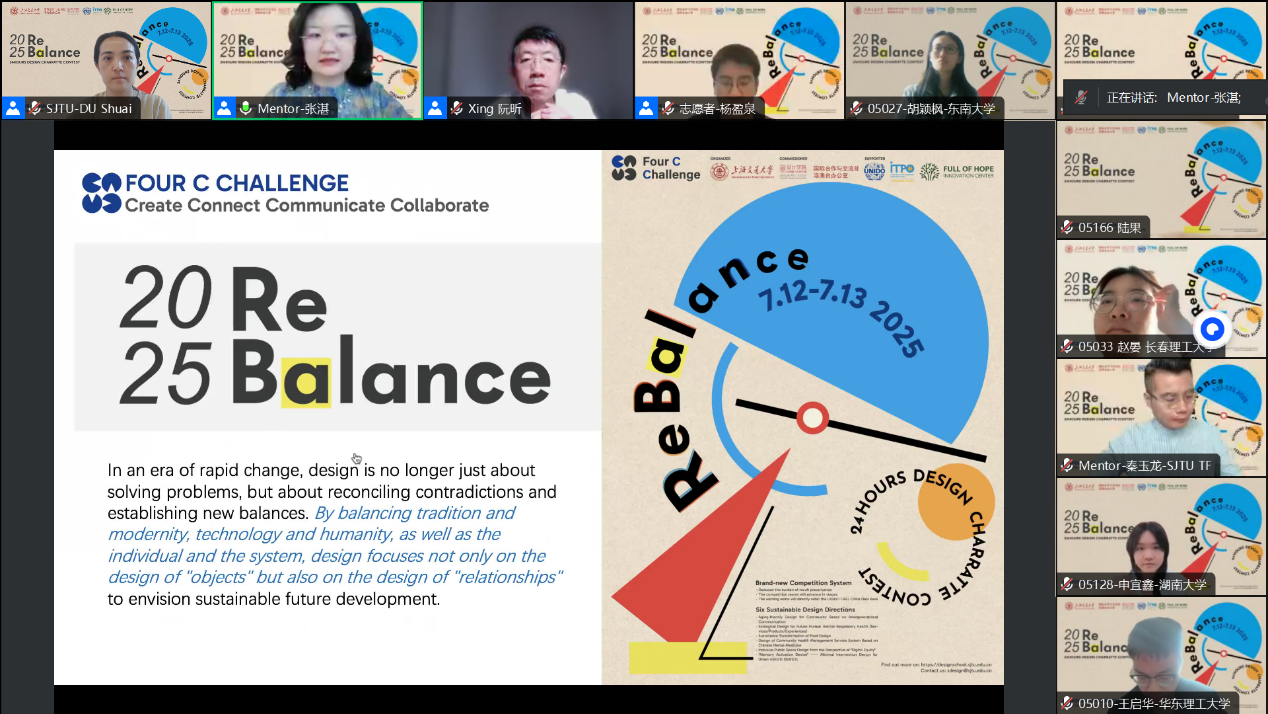
A 24 Hours Creative Surge: Creativity Soars, Powered by Intercollegiate Synergy
On July 12-13, online competition was launched with a highly challenging Make-a-thon model. Participants from top universities worldwide were grouped across institutions based on six sustainable design themes. Students from diverse nationalities and academic backgrounds quickly broke barriers, engaging in dynamic discussions and collaborative work in virtual spaces.
Effective teamwork among newly formed groups required rapid ice-breaking, seamless communication, and the establishment of efficient workflows—all within an extremely tight timeframe. This perfectly embodies the core FourC spirit:
· Connect proactively with unfamiliar teammates,
· Communicate ideas effectively,
· Collaborate closely to tackle challenges, and
· Create remarkable outcomes together.
The ability to overcome barriers and forge consensus under such conditions was truly commendable.
From Intergenerational Aging-Friendly Community Design to Inclusive Public Space Design from the Perspective of “Digital Equity”, from Ecological Design for Future Human Habitat to "Memory Activation Device" - A Light-Intervention Design Approach for Urban Historic Districts, from Sustainable Transformation of Food Design to Design of Community Health Management Service System Based on Chinese Herbal Medicine – all teams efficiently completed their conceptualization and deliverables within 24 hours. Guided by faculty from leading global design institutions, this intensive ideation session combined academic rigor with creative energy. Following the "Understand-Define-Ideate-Prototype" framework under the "ReBalance" theme, teams moved beyond conventional product design to reimagine systemic relationships - offering groundbreaking approaches to realizing sustainable and equitable futures.
Six Key Themes Emerge: Next-Gen Designers Shape Sustainable Futures
Following rigorous evaluation by industry experts across criteria including innovation, feasibility, and social impact, 1-2 standout teams were selected from each of the six challenge themes. Below we present the shortlisted projects that demonstrate a clear trajectory from sustainable design concepts to actionable solutions.
· Intergenerational Aging-Friendly Community Design
Shortlisted Team: Team 8 Deep sink
Team members:
LU Yonghang, Jiangnan University
YU Shiwei, Shanghai University of Engineering Science
HUANG Yixin, Nanjing University of Science and Technology
ZHANG Zhaowen, Xiamen University
CHEN Xinyu, Southwest University
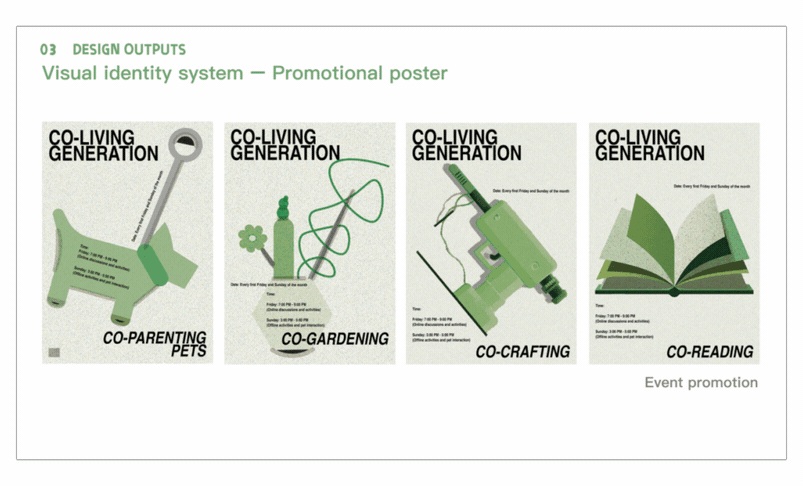
Project Introduction:Based on the perspective of intergenerational communication and the theoretical support of age-appropriate design, the project will use an innovative "Co-living" interaction model to promote emotional connections between the elderly and children through joint activities and projects, and break down the communication barriers between generations.
· Ecological Design for Future Human Habitat
Shortlisted Team:Team 2 Pentaverse
Team members:
LUAN Yihui, Jiangnan University
LONG Weiyu, South China University of Technology
XU Shiyu, Shanghai Jiao Tong University
LIU Yanxi, China Academy of Art
ZHAO Mengran, Sichuan Fine Arts Institute
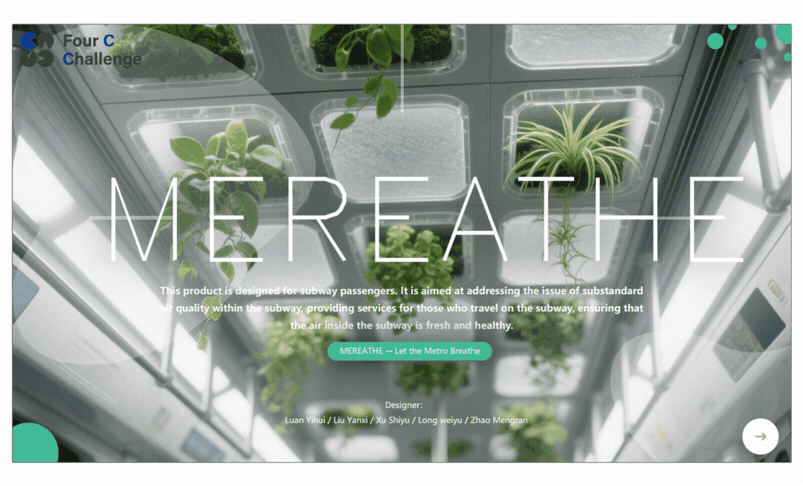
Project Introduction:This project targets worsening air quality in urban public transport, addressing subway passengers' respiratory health issues with an intelligent system integrating air purification and emotional healing.
Shortlisted Team: Team 4 Lucky Lung
Team members:
HU Jingyi, Huazhong Agricultural University
ZHANG Qing, Sichuan Fine Arts Institute
WANG Yikai, Hunan University
JIN Biru, Southeast University
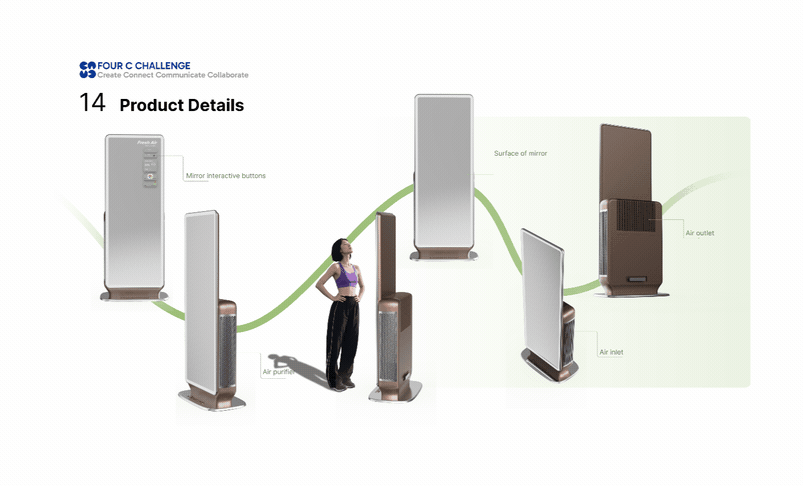
Project Introduction:This intelligent mirror is designed with a core focus on breathing training, using people’s natural habit of looking into the mirror to guide them toward healthier breathing patterns every day. Through its interactive screen, users receive personalized, visual breathing exercises that emphasize correct breathing techniques, helping to reduce stress, improve lung capacity, and support long-term respiratory health. The built-in breathing light changes rhythm according to the user’s breath, turning each session into an immersive and calming experience. Simultaneously, the mirror purifies indoor air, creating a cleaner environment to support each breathing exercise. This seamless integration of breathing training with air purification allows users to naturally develop healthy breathing habits without interrupting their daily routines. Ideal for bedrooms, offices, and meditation spaces, this smart mirror transforms everyday mirror use into an active step toward better breathing, blending technology with daily wellness in a gentle, intervention-based approach.
· Sustainable Transformation of Food Design
Shortlisted Team:Team 15 努力不通宵
Team members:
TENG JIaqi, Shanghai Jiao Tong University
HUI Yao, Shanghai Jiao Tong University
CAI Haozong, Macau University of Science and Technology
ZHAO Yan, Changchun University of Science and Technology
ZHU Jingyan, East China Normal University
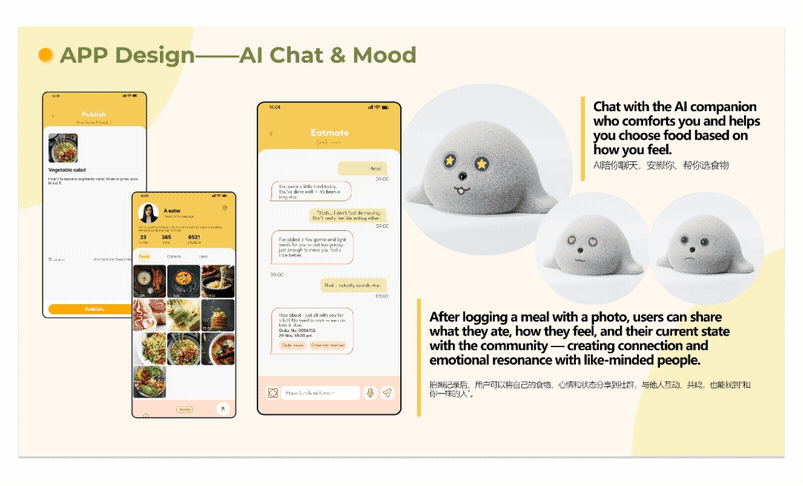
Project Introduction:Eatmate AND Feelyum is a food-based emotional support system that combines AI-driven IP companionship, mood-aware meal suggestions, and visual tracking to help young people reconnect with eating as an act of comfort, care, and emotional presence in their fast-paced lives.
· Design of Community Health Management Service System Based on Chinese Herbal Medicine
Shortlisted Team:Team 13 Qingnang Yunfang
Team members:
LOU Weihui, Jiangnan University
DAI Luyan, Shanghai Jiao Tong University
ZHOU Xuefei, China Academy of Art
CAO Ying, Northwestern Polytechnical University
YANG Yuxin, Southeast University
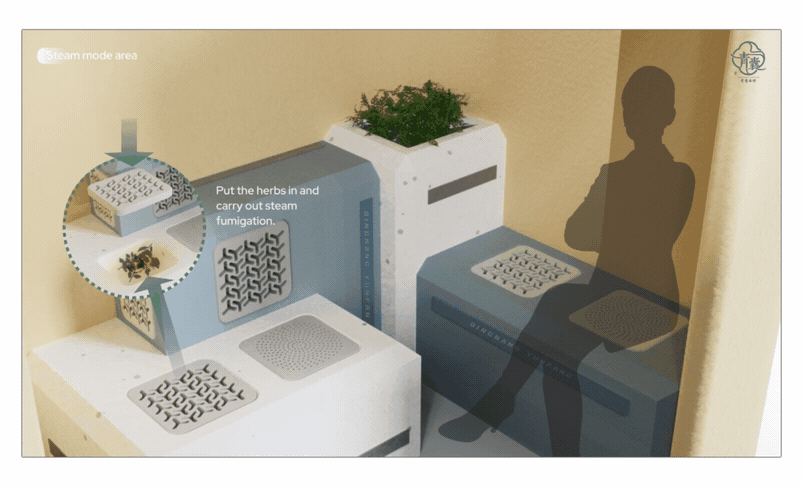
Project Introduction:Herbal Blossoms is an AI-powered herbal care kiosk designed to support women through menstruation, pregnancy, postpartum, and menopause. Integrating Traditional Chinese Medicine with intuitive interfaces, it delivers personalized tea sachets based on symptoms. The system promotes sustainable self-care while reviving intangible cultural heritage—through non-invasive moxibustion, Sachet-making, and the daily use of classic herbal formulas. By embedding tradition into modern community life, Herbal Blossoms transforms ancient wisdom into accessible, empowering wellness experiences for all women.
· Inclusive Public Space Design from the Perspective of “Digital Equity”
Shortlisted Team:Team 19 PolyMuse
Team members:
HU Yifan, Hunan University
LIU Shuhan, Shanghai Jiao Tong University
YANG Chenlu, Jiangnan University
SHI Yue, China University of Geosciences
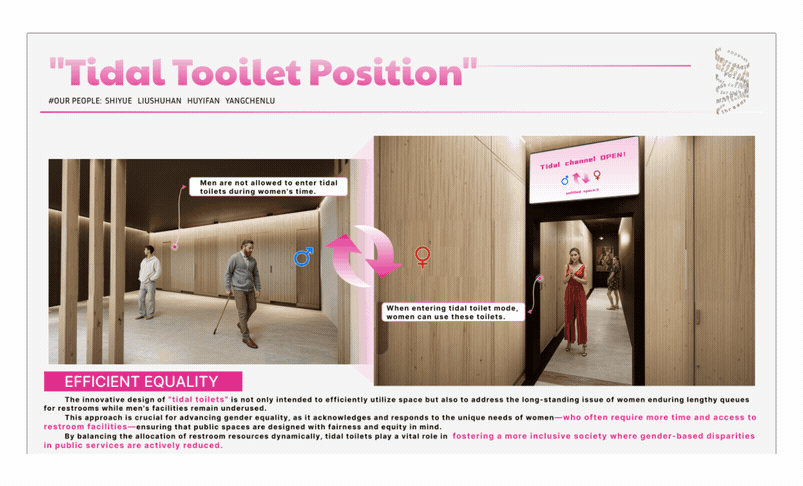
Project Introduction:The project is centered on “public space design under the perspective of digital affirmative action”, focusing on women's toileting and menstruation-friendly needs, and constructing a complete toileting and menstruation care system through “APP+space linkage”.
· "Memory Activation Device" - A Light-Intervention Design Approach for Urban Historic Districts
Shortlisted Team:Team 25 MemoBalance-25
Team members:
REN Lingzhi, China Academy of Art
ZHOU Zixuan, South China University of Technology
QUE Yuan, Southwest Jiaotong University
ZHANG Junjie, Hubei Institute of Fine Arts
WANG Pei, Shanghai Jiao Tong University

Project Introduction:This project achieves a natural transition between space, time and memory in the "historical-modern abrupt gap" of the city by constructing a multi-dimensional design system with "waiting at traffic lights" as the triggering behavior. With mechanical page-turning devices, visual guidance, zebra crossing timelines, and sundial-style time markings as the core, it realizes dual-mode immersive experiences during both day and night.
Next Stage
All winning entries have been directly nominated for the UNIDO Global Call China Pipeline and will represent China in this year's United Nations Industrial Development Organization (UNIDO) Global Call for Sustainable Development Solutions. These projects stand to compete for UNIDO Global Medals with the opportunity to present at the awards ceremony in Riyadh, Saudi Arabia. The shortlisted teams are invited to participate in an international on-site workshop at Shanghai Jiao Tong University from August 24 to 30. During this intensive program, experienced mentors will provide end-to-end guidance to help teams define and optimize their design solutions, develop actionable implementation strategies, and transform innovative concepts into tangible outcomes. This workshop serves as a critical platform to elevate projects from the ideation stage to real-world application, with expert support at every step of the process.
Beyond Competition: A Transnational Design Dialogue
Since its launch in 2020, the FourC Challenge has consistently upheld its founding principles of Create, Connect, Communicate, and Collaborate, establishing itself as a premier global platform for young designers. This year's edition continued its signature interdisciplinary and cross-border approach, bringing together over 100 participants from diverse institutions for an intensive 24-hour design marathon. Through this unique format, the competition serves as a powerful bridge - enabling emerging designers to expand their worldview while developing practical solutions to pressing challenges. More than just a contest, the FourC Challenge has become a transformative experience that cultivates both design excellence and meaningful international connections.
True to its "ReBalance" theme, this year's FourC Challenge demonstrated how design serves not merely as a problem-solving tool, but as a vital mediator - harmonizing tradition with innovation, technology with humanity, and individual needs with systemic frameworks. While the 2025 competition has concluded, its impact continues: these thoughtful solutions and the participants' innovative spirit will persistently energize the creation of sustainable, healthy, and livable environments. As we anticipate the August workshop, we look forward to seeing these ideas achieve even greater refinement, ready to showcase Chinese youth's design leadership on the global stage.